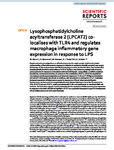Lysophosphatidylcholine acyltransferase 2 (LPCAT2) co-localises with TLR4 and regulates macrophage inflammatory gene expression in response to LPS
| dc.contributor.author | Abate, W | |
| dc.contributor.author | Alrammah, H | |
| dc.contributor.author | Kiernan, Michele | |
| dc.contributor.author | Tonks, AJ | |
| dc.contributor.author | Jackson, SK | |
| dc.date.accessioned | 2021-11-05T13:38:56Z | |
| dc.date.issued | 2020-06-25 | |
| dc.identifier.issn | 2045-2322 | |
| dc.identifier.issn | 2045-2322 | |
| dc.identifier.uri | http://hdl.handle.net/10026.1/18244 | |
| dc.description.abstract |
Despite extensive investigations, an efective treatment for sepsis remains elusive and a better understanding of the infammatory response to infection is required to identify potential new targets for therapy. In this study we have used RNAi technology to show, for the frst time, that the inducible lysophosphatidylcholine acyltransferase 2 (LPCAT2) plays a key role in macrophage infammatory gene expression in response to stimulation with bacterial ligands. Using siRNA- or shRNA-mediated knockdown, we demonstrate that, in contrast to the constitutive LPCAT1, LPCAT2 is required for macrophage cytokine gene expression and release in response to TLR4 and TLR2 ligand stimulation but not for TLR-independent stimuli. In addition, cells transfected to overexpress LPCAT2 exhibited increased expression of infammatory genes in response to LPS and other bacterial ligands. Furthermore, we have used immunoprecipitation and Western blotting to show that in response to LPS, LPCAT2, but not LPCAT1, rapidly associates with TLR4 and translocates to membrane lipid raft domains. Our data thus suggest a novel mechanism for the regulation of infammatory gene expression in response to bacterial stimuli and highlight LPCAT2 as a potential therapeutic target for development of anti-infammatory and anti-sepsis therapies. | |
| dc.format.extent | 10355- | |
| dc.format.medium | Electronic | |
| dc.language.iso | en | |
| dc.publisher | Springer Science and Business Media LLC | |
| dc.subject | 1-Acylglycerophosphocholine O-Acyltransferase | |
| dc.subject | Animals | |
| dc.subject | Cell Line, Tumor | |
| dc.subject | Gene Expression Regulation | |
| dc.subject | Gene Knockdown Techniques | |
| dc.subject | Humans | |
| dc.subject | Lipopolysaccharides | |
| dc.subject | Macrophages, Peritoneal | |
| dc.subject | Membrane Microdomains | |
| dc.subject | Mice | |
| dc.subject | Monocytes | |
| dc.subject | Primary Cell Culture | |
| dc.subject | RAW 264.7 Cells | |
| dc.subject | RNA, Small Interfering | |
| dc.subject | Sepsis | |
| dc.subject | Signal Transduction | |
| dc.subject | Toll-Like Receptor 4 | |
| dc.title | Lysophosphatidylcholine acyltransferase 2 (LPCAT2) co-localises with TLR4 and regulates macrophage inflammatory gene expression in response to LPS | |
| dc.type | conference | |
| dc.type | Journal Article | |
| plymouth.author-url | https://www.webofscience.com/api/gateway?GWVersion=2&SrcApp=PARTNER_APP&SrcAuth=LinksAMR&KeyUT=WOS:000546571800032&DestLinkType=FullRecord&DestApp=ALL_WOS&UsrCustomerID=11bb513d99f797142bcfeffcc58ea008 | |
| plymouth.issue | 1 | |
| plymouth.volume | 10 | |
| plymouth.publication-status | Published online | |
| plymouth.journal | Scientific Reports | |
| dc.identifier.doi | 10.1038/s41598-020-67000-x | |
| plymouth.organisational-group | /Plymouth | |
| plymouth.organisational-group | /Plymouth/Faculty of Health | |
| plymouth.organisational-group | /Plymouth/Faculty of Health/School of Biomedical Sciences | |
| plymouth.organisational-group | /Plymouth/Research Groups | |
| plymouth.organisational-group | /Plymouth/Research Groups/Institute of Translational and Stratified Medicine (ITSMED) | |
| plymouth.organisational-group | /Plymouth/Research Groups/Institute of Translational and Stratified Medicine (ITSMED)/CBR | |
| plymouth.organisational-group | /Plymouth/Users by role | |
| plymouth.organisational-group | /Plymouth/Users by role/Academics | |
| plymouth.organisational-group | /Plymouth/Users by role/Researchers in ResearchFish submission | |
| dc.publisher.place | England | |
| dcterms.dateAccepted | 2020-05-06 | |
| dc.rights.embargodate | 2021-11-6 | |
| dc.identifier.eissn | 2045-2322 | |
| dc.rights.embargoperiod | Not known | |
| rioxxterms.versionofrecord | 10.1038/s41598-020-67000-x | |
| rioxxterms.licenseref.uri | http://www.rioxx.net/licenses/all-rights-reserved | |
| rioxxterms.licenseref.startdate | 2020-06-25 | |
| rioxxterms.type | Conference Paper/Proceeding/Abstract |


